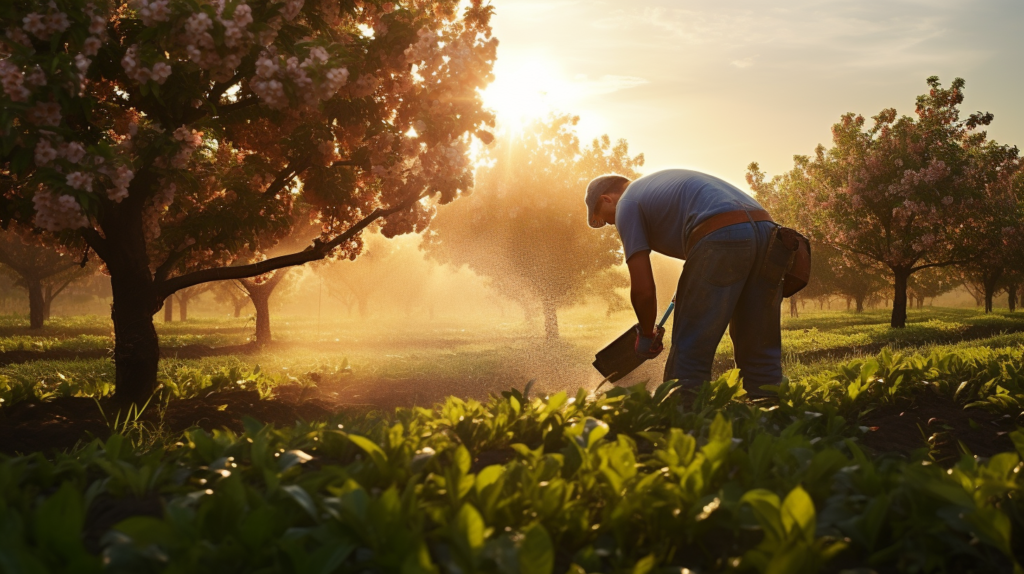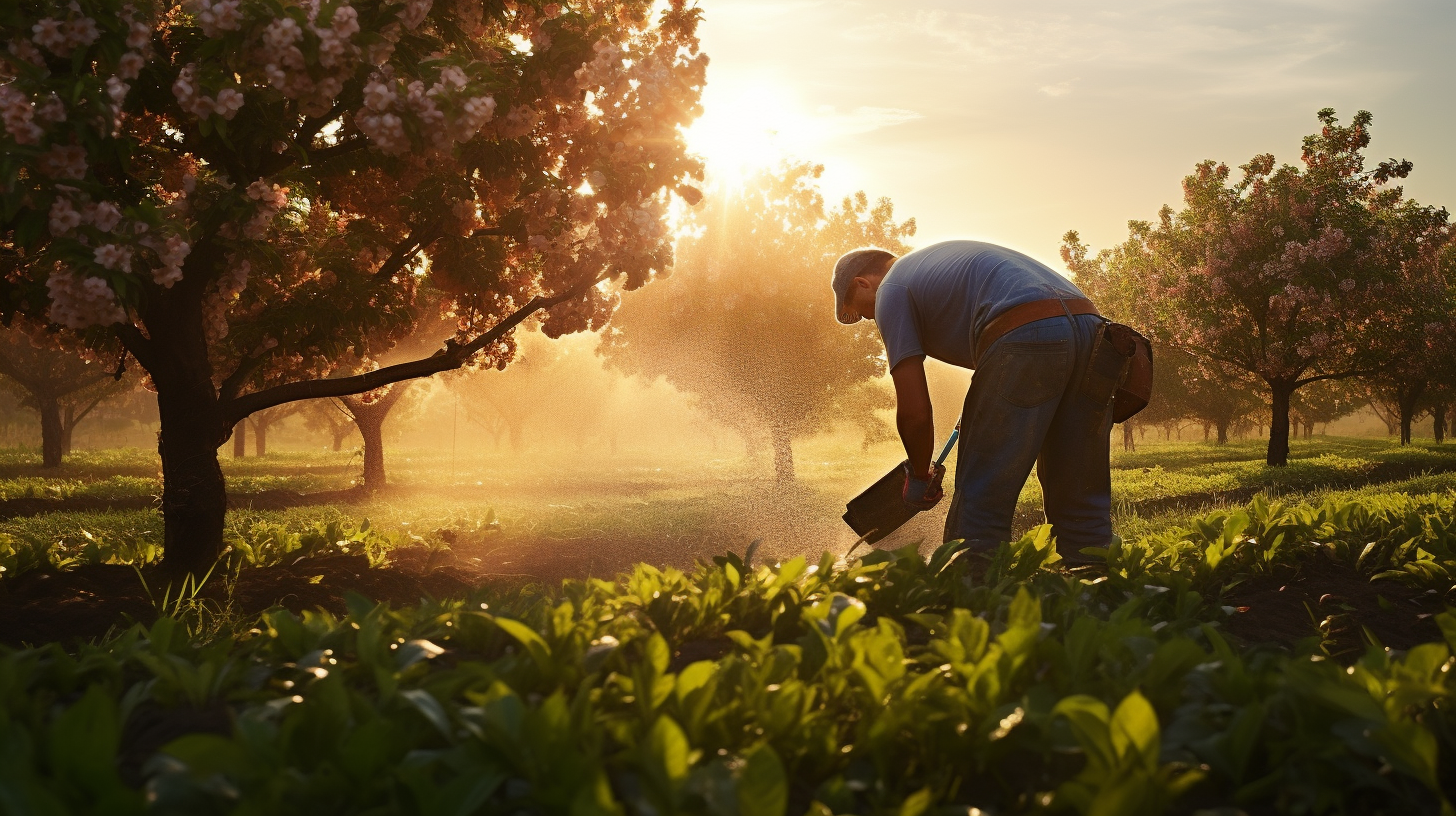Looking to maximize the health and productivity of your fruit trees? You’ve come to the right place! In this article, we’ll explore the best time to fertilize your trees, ensuring they thrive.
Timing is crucial, and early spring is prime for fertilizing. By doing so, you allow your trees to absorb essential nutrients before new growth begins, promoting vigor and preventing leaf scorch.
We’ll also guide you in selecting the right fertilizer for your trees based on their location, soil type, and drought tolerance.
Let’s dive into the secrets of bountiful harvests!

What is the Best Time to Fertilize Fruit Trees and Why
The best time to fertilize your fruit trees is in early spring. This is when the trees are coming out of their winter dormancy and beginning to prepare for new growth. Fertilizing at this time allows the trees to absorb the nutrients they need to support healthy growth and abundant fruit production.
Applying fertilizer later in the season can result in wasted nutrients, as the trees may not be able to fully utilize them before the growing season ends.
Fertilizing in early spring also helps prevent issues like leaf scorch, which can occur when the trees don’t have enough nutrients to support new growth. By providing the trees with the necessary nutrients early on, you can ensure that they’ve the resources they need to thrive throughout the growing season.
When choosing a fertilizer for your fruit trees, it’s important to select one that’s specifically formulated for use on fruit trees. These fertilizers typically have a higher percentage of nitrogen, phosphorus, and potassium (NPK), which are essential nutrients for fruit tree growth and development.
To ensure proper application, follow the instructions on the fertilizer package carefully. Over-fertilizing can harm your trees and make them more vulnerable to pests and diseases. If you have any doubts or questions, consult with a local nursery or Cooperative Extension office for specific recommendations.
How Many Times a Year Should I Fertilize My Fruit Trees
How often should you fertilize your fruit trees throughout the year? Here are three key points to consider:
- Two to three times per year: It’s recommended to fertilize your fruit trees two to three times per year. This ensures that they receive the necessary nutrients for healthy growth and production. Fertilizing in early spring and late fall is the best approach, as it allows the tree to absorb the nutrients before and after the growing season.
- Avoid fertilizing during summer: It’s important to avoid fertilizing your fruit trees during the summer months when they’re actively growing. Fertilizing during this time can lead to leaf burn or other damage. Instead, focus on providing nutrients in the early spring and late fall when the tree can benefit the most.
- Follow package instructions: When applying fertilizer to your fruit trees, always follow the package instructions. Different fertilizers may have specific guidelines for application rates and techniques. Proper application will help prevent over-fertilization and ensure that your trees receive the right amount of nutrients.
How Often to Fertilize Fruit Trees?
To ensure healthy growth and optimal fruit production, fertilize your fruit trees two to three times per year.
The general rule of thumb is to fertilize them once in early spring, once in mid-summer, and once in late fall.
However, it’s important to note that the frequency of fertilization may vary depending on the type of tree and the climate where you live. Consulting with your local nursery or Cooperative Extension office can provide you with specific recommendations for your specific type of fruit tree.
Fertilizing your fruit trees at the right times throughout the year is crucial for their overall health and productivity.
- Applying fertilizer in early spring allows the trees to absorb the necessary nutrients before new growth begins.
- Fertilizing in mid-summer is generally not recommended as it may result in wasted nutrients, as the trees are already actively growing during this time.
- Late fall fertilization helps prepare the trees for the upcoming winter and promotes healthy root development.
Type of Fertilizer I Should Use for Fruit Trees
For optimal growth and fruit production, choose a fertilizer specifically designed for fruit trees. When selecting a fertilizer for your fruit trees, keep the following factors in mind:
- High NPK Percentage: Look for a fertilizer with a high percentage of nitrogen, phosphorus, and potassium (NPK). These nutrients are essential for the healthy development of fruit trees.
- Organic or Synthetic: Decide whether you prefer organic or synthetic fertilizers. Both options are effective, so choose the one that aligns with your personal preferences and gardening practices.
- Consider Tree’s Needs: Consider the specific needs of your fruit trees, including their location, soil type, and drought tolerance. This will help you select a fertilizer that addresses the specific requirements of your trees.
Remember to follow the package instructions carefully when applying fertilizer to your fruit trees. Applying too much fertilizer can be harmful, so it’s important to use the correct amount. If you’re unsure about the appropriate dosage, consult with your local nursery or gardening center for guidance.
Which Fertilizer is Best for Fruit Trees?
To determine the best fertilizer for your fruit trees, consider their specific needs and consult with a nursery or gardening expert. In general, most fruit trees thrive with a nitrogen-rich fertilizer. Nitrogen is essential for promoting growth and green leaves, which are important for a healthy fruit tree.
When choosing a fertilizer, take into account the tree’s location, soil type, and drought tolerance. For example, if your tree is in a sunny area, it may benefit from a fertilizer with higher levels of nitrogen. On the other hand, if your tree is in a shady area, it may require a fertilizer with lower nitrogen levels.
Consider the soil type. Sandy soil may require a fertilizer with higher nitrogen levels, while clay soil may benefit from a balanced fertilizer. It’s also important to note that drought-tolerant trees may need a fertilizer with higher nitrogen levels to support their resilience.
What Fertilizer Make Fruit Bigger?
If you want to make your fruit bigger, choose a fertilizer that’s rich in nutrients specifically designed to promote fruit growth. Here are three key factors to consider when selecting a fertilizer to make your fruit bigger:
- High Nitrogen Content: Look for a fertilizer with a high percentage of nitrogen (N). Nitrogen is essential for leaf and stem growth, which in turn supports the development of larger fruits. A nitrogen-rich fertilizer will ensure that your fruit trees have the necessary nutrients to produce bigger and healthier fruits.
- Adequate Phosphorus Levels: Phosphorus (P) is another important nutrient for fruit development. It helps in the formation of flowers, fruits, and roots. Choosing a fertilizer with a balanced ratio of nitrogen to phosphorus will provide the necessary nutrients for fruit enlargement and overall tree health.
- Potassium Boost: Potassium (K) is crucial for fruit quality and flavor. It aids in the transportation of nutrients and water within the tree, leading to the production of larger and sweeter fruits. Look for a fertilizer that contains a significant amount of potassium to enhance fruit size and taste.
Is 16-16-16 Fertilizer Good for Fruit Trees
When considering the best fertilizer for fruit trees, you may be wondering if 16-16-16 fertilizer is suitable for your trees.
The answer is yes! 16-16-16 fertilizer is an all-purpose fertilizer that can be used on most fruit trees, promoting healthy growth and fruiting. It contains equal amounts of nitrogen, phosphorus, and potassium, which are essential nutrients for plants.
To apply 16-16-16 fertilizer, follow the manufacturer’s instructions carefully to avoid overfertilizing. Apply the fertilizer around the base of the tree, avoiding contact with leaves and branches, and water thoroughly after application.
Fertilizing fruit trees once a year in early spring is generally sufficient, but if you notice signs of nutrient deficiency, such as yellowing leaves or stunted growth, more frequent fertilization may be necessary. Conducting a soil test can help determine if your soil requires additional nutrients and the appropriate amount to apply.
Should You Fertilize Fruit Trees in the Fall
While fertilizing fruit trees in the fall can be beneficial, it’s important to consider the specific needs of your trees and consult with experts for proper guidance. Here are three things to keep in mind when deciding whether to fertilize your fruit trees in the fall:
- Tree Health: Assess the overall health of your fruit trees before applying fertilizer in the fall. If the trees are already healthy and producing good fruit, they may not require additional fertilization. However, if your trees show signs of nutrient deficiencies or have been recently transplanted, fall fertilization can help boost their health and prepare them for the upcoming growing season.
- Soil Conditions: Check the soil conditions around your fruit trees. If the soil is already fertile and rich in nutrients, additional fertilization may not be necessary. On the other hand, if the soil is lacking in nutrients, a fall application of fertilizer can provide the necessary nutrients for the trees to thrive.
- Climate and Growing Zone: Consider the climate and growing zone in which your fruit trees are located. In regions with mild winters, fall fertilization can be beneficial, as the trees will continue to grow and absorb nutrients throughout the winter months. However, in colder climates where the ground freezes, fall fertilization may not be as effective, as the frozen soil will prevent the trees from absorbing the nutrients.
Frequently Asked Questions
How Do I Determine the Best Time to Fertilize Fruit Trees Based on My Specific Location?
To determine the best time to fertilize fruit trees based on your specific location, consult with a local nursery or Cooperative Extension office. They can provide specific recommendations based on your region’s climate and growing conditions.
Can I Use a General-Purpose Fertilizer or Do I Need a Specific One for Fruit Trees?
You should use a specific fertilizer designed for fruit trees. Look for one with a high percentage of nitrogen, phosphorus, and potassium (NPK). This will provide the nutrients your fruit trees need for healthy growth and fruit production.
Are There Any Natural or Homemade Fertilizers That Are Effective for Fruit Trees?
Yes, there are natural and homemade fertilizers that can be effective for fruit trees. Options include compost, manure tea, fish emulsion, and bone meal. Research recipes and application methods for best results.
Are There Any Signs or Symptoms to Look for That Indicate My Fruit Trees Need Fertilizer?
Look for signs like stunted growth, yellowing leaves, or decreased fruit production to indicate when your fruit trees need fertilizer. Applying it in early spring is the best time for healthy growth.
Can I Over-Fertilize My Fruit Trees and What Are the Potential Consequences?
Yes, you can over-fertilize your fruit trees. This can lead to nutrient imbalances, root burn, and even tree death. It’s important to follow package instructions and consult with experts to avoid over-fertilization.
Conclusion
The best time to fertilize fruit trees is during early spring and late fall. By fertilizing during these periods, you ensure that the tree absorbs the necessary nutrients before new growth begins and promote healthy and robust growth.
It’s recommended to fertilize fruit trees two to three times a year, using a fertilizer specifically designed for fruit trees. By following these guidelines, you can maximize the health and productivity of your fruit trees and enjoy bountiful harvests.
